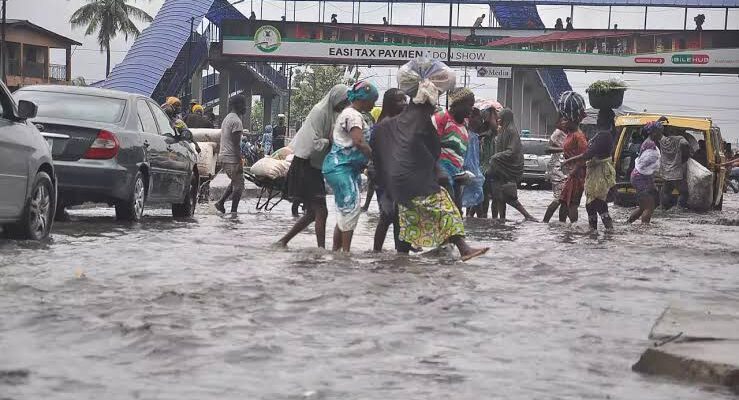Business and social activities were brought to a standstill across Lagos on Monday following hours of relentless rainfall that submerged roads, flooded homes, and triggered widespread traffic chaos across the metropolis.
The early morning downpour, which began around midnight and continued into the day, led to flash floods on major roads both on the Island and Mainland, leaving many residents and motorists stranded for hours. The situation was so dire that some commuters were seen stranded at bus stops, unable to move even after the rain subsided by 9 a.m.
The Nigerian Meteorological Agency (NiMet) had earlier predicted thundery and rainy conditions across several states, including Lagos, from Monday through Wednesday. In a weather outlook released on Sunday, NiMet warned of likely flash floods in parts of the country, especially in low-lying and coastal areas.
True to the forecast, Lagos experienced one of its most severe flood episodes in recent months, with key areas such as Odo Iya Alaro in Ikorodu, Ikotun, Igando, and Oworonshoki heavily affected. Motorists cautiously navigated flooded roads where potholes were completely concealed, and many vehicles were seen broken down or stuck in the water.
A commuter, Alhaji Abu, described the experience on Odo Iya Alaro Bridge as “hectic,” saying: “Since the flood had covered all the potholes on the road, motorists had to be cautious not to be stranded inside the flood.”
Residents in affected areas, including Gberegbe in Ikorodu, lamented that recurring floods have become unbearable. Modupe Akinbiyi, a resident, said: “We do experience heavy floods each time it rains. We’ve sent complaints to the government and the Ministry of the Environment and Water Resources without any meaningful response.”
Reacting to the incident, the Lagos State Commissioner for the Environment and Water Resources, Mr. Tokunbo Wahab, urged residents to remain calm but vigilant. He explained that the city’s coastal nature, compounded by climate change, makes it particularly vulnerable to flash floods and tidal locks.
Wahab advised residents in low-lying areas to temporarily relocate to higher ground to avoid loss of lives and property. “With the rise in lagoon water levels during heavy rainfalls, discharge from drainage collectors becomes difficult, leading to flash floods,” he said.
He also warned motorists and pedestrians against wading through flooded roads, stressing that such actions could lead to tragic consequences, including drowning or vehicle submersion.
The commissioner further cautioned against the indiscriminate dumping of refuse into drains during rainfall, blaming it as a major cause of clogged drainage and flash flooding. He assured the public that the government is ramping up efforts to clear and maintain drainage systems across the state and is awarding contracts for the construction of concrete-lined drainage channels.
“As we continue to witness more intense rainfall, concerted efforts are required from both the government and residents to mitigate its effects,” Wahab said.
The state government has reiterated its commitment to flood preparedness but calls on citizens to play their part in ensuring a safer, cleaner environment.

Comments